- Home
- Janet Dailey
American Dreams
American Dreams Read online
American Dreams
Janet Dailey
Author's Note
While the main characters in this novel and their individual stories are fictional, the background against which they appear is fact. All incidents and events in this novel relating to the court battles of the Cherokee Nation, the harassment by the Georgia Guard, the Cherokees' valiant efforts to peacefully resist removal for eight long years, and the split within the Cherokee Nation between the supporters of the principal chief and the treaty advocates for removal are true. Unfortunately, so are the descriptions of the detention camps (which today we would label concentration camps), the long trail of tragedy and suffering, and the ruinous destruction that occurred in the Cherokee Nation during the Civil War.
The fictional characters in this novel—specifically those of Cherokee ancestry—represent the better-educated and more prosperous class that existed during that time. Their holdings, their life-styles, and their residences were typical of the Southern planters of that day—as evidenced by the homes of Chief Vann and Major Ridge in Georgia and the Murrell home in Oklahoma, all of which are open for public viewing today.
The Cherokee Nation had its own written constitution and laws, an elected government, and a judicial system. In addition, it had its own newspaper, The Cherokee Phoenix, printed in both English and Cherokee. They truly deserved to be called "one of the five civilized tribes."
It is in the context of fact that this novel is written, with the hope that through fiction we may all understand why the road they were forced to travel west was called by the Cherokee the Trail Where They Cried.
PART I
Build a fire under them. When it gets hot enough, they'll move.
—President-elect Andrew Jackson
1
Cherokee Nation
July 1830
The mud-splattered stagecoach rolled to a stop in front of the Chester Inn, where several people stood on the porch awaiting its arrival. Two were white men, each garbed in the plain suit and starched collar worn by missionaries. Two others were of Cherokee blood and wore an odd mixture of dress. Their leather moccasins rose nearly to the knees of their white-man's trousers, sashes belted the waists of their white-man's shirts, and brightly colored cloth wound turban-fashion about their heads.
A young woman of uncommon beauty and self-possession stood apart from the group. Clothed in a purple day dress and a matching silk bonnet trimmed with pink roses, the girl had lustrous black hair parted in the center and swept sleekly back from features that appeared to have been sculpted by an artist's hand. Her black slave hovered nearby.
Anxious to meet the new tutor, Temple Gordon glanced impatiently at the stagecoach driver. He moved, in her estimation, with irritating slowness as he climbed down from the seat and slogged through the mud to the coach door. She wished he would hurry, for she had heard that the Georgia Guard were in the area and it hardly mattered to her whether it was truly the state militia that had been seen or one of the numerous bands of marauders known locally as pony clubs. Temple knew the ill-trained and ill-disciplined Georgia Guard were essentially vigilantes with an exaggerated sense of self-importance and disdain for the rights of others.
She needed to collect the family's new tutor—Miss Eliza Hall— and be quickly on her way. She was not so much concerned for her own safety as she was for her mother. Victoria Gordon had remained at home alone with the children, and Temple was fearful of how they would react should the Guard arrive at Gordon Glen.
"Spring Place!" the driver yelled as he yanked open the stagecoach door.
A young missionary, thin of face and long of body, stepped out first. All arms and legs like some gangly colt, he turned to assist a female passenger, who was tall and plain. The woman bore no resemblance at all to the starched and primly groomed missionary wives who had taught Temple at the Brainerd mission school. Stray wisps of light brown curls poked out from beneath a bonnet that was slightly askew. Her brown traveling suit was rumpled and the angle of her chin was almost combative.
While Temple watched, the young woman negotiated the three muddy yards to the inn's steps and marched straight up to Charlie Blue Bird and Tom Morgan. "I am Eliza Hall from Massachusetts," she announced. "I am to be met at this place by Will Gordon."
Temple turned to her waiting servant, who was dressed in the livery of a footman. "I believe the woman in the brown dress is the new tutor, Miss Eliza Hall. Bring her to me, Ike."
"Yes'm, Miz Temple," he said with a quick bob of his head, moving to do her bidding.
The new tutor continued to stand before the pair of Cherokee men, bewilderment evident in her expression when neither responded. She took no notice of the servant's approach. When Ike reached her, he took off his hat.
"Beggin' your pardon, miss," Ike said, at last claiming her attention. "Be you Miz Hall from up No'th?"
It took the woman a full second to decipher his thickly drawled question. "I am, yes."
"Miz Temple, she be waiting fo' you over there." With a sweep of his doffed hat, Ike gestured to Temple, then indicated that the new tutor should precede him.
The woman cast a puzzled glance at the lanky young missionary with her. He too seemed a bit taken aback by the turn of events, but nodded for her to proceed, then followed himself as she walked over to Temple.
"That will be all for now, Ike." Temple dismissed her black servant with a flick of her gloved hand and studied the new tutor with undisguised curiosity. "You are Miss Eliza Hall from Massachusetts."
"I am." Eliza Hall raised her chin a little higher as she made her own thorough appraisal of Temple, whose eyes were as black as onyx, like her hair, and whose face was as fair and smooth as the finest ivory. Unprepared to find herself face to face with such blatant beauty, she stiffened, aware she was positively homely by comparison. Defensively, she searched for flaws in the young woman, and found them in the willfully proud tilt of her head and faintly autocratic manner. She was young as well—hardly more than sixteen. At the advanced age of twenty herself, Eliza Hall regarded sixteen as exceedingly young.
"I am Temple Gordon. My father sends his apologies. He was called away to an important meeting which has made it impossible for him to meet you himself."
"Your father is Will Gordon?" she asked, her surprise and shock showing.
"He is."
"I was told your family was Cherokee." As always, Eliza Hall spoke her mind, fully aware that few regarded candor as a virtue. But it was a trait she had never been able to control and had long since ceased to try, and right now she needed to clarify the incongruous images before her eyes.
"We are Cherokee," Temple asserted with a proud flare of temper that she quickly cloaked in a cool hauteur.
"Forgive me, but you do not look at all like an Indian." Eliza Hall stared anew at Temple and her elegant gown with its matching bonnet. She had clearly expected beaded buckskins, moccasins, and a long black braid.
Temple struggled to control her mounting indignation. She longed to turn her back on this woman and her ignorant attitude and walk off, but she was here in her father's stead. And Temple knew that her father would never be provoked into rudeness by such a remark.
"The blood in our veins is Cherokee, as are the feelings in our hearts," Temple stated, using the words her father would have chosen although her voice was more heated than his would have been.
"Miss Hall meant no offense by her remark, I assure you," the tall, pale missionary interposed in quick apology.
Temple turned her cool black eyes on him. "And you are?"
"Reverend Nathan Cole, newly assigned to the area by the American Board of Foreign Missions in Boston." He dipped his head in a faint, respectful bow. "Mr. Payton Fletcher asked that I accompany Miss Hall
on her journey and see her safely into the care of her employer."
"Your task is complete, Reverend Cole. Thank you," Temple said, then directed her next remark to the tutor. "We have yet another hour's ride ahead of us. If you would point out your luggage, Miss Hall, I will have Ike load it into the carriage." With a brief wave of her hand, she indicated the open carriage and team of chestnut horses tied to a rail at the end of the porch.
Eliza identified her trunk and valise, then turned to take her leave of Reverend Cole, a trace of regret in her expression. "Your company has been most pleasant. I shall miss it."
"And I shall miss yours."
She was not so foolish as to read anything more into his words. She had once mistaken a man's words of kindness for romantic affection, and later suffered the abject humiliation of that mistake. It was an error she had vowed never to make again.
"I will write Mr. Fletcher and assure him that you saw me safely to my destination."
"I hope you will write me also, so that I may know all is well with you in your new surroundings. It would put my mind at ease." A hesitant smile broke across his thin, intense face, an awkwardness in it that matched the rest of him. "You know where I can be reached."
"Yes, and I promise I shall write you."
With her good-byes finally said and her baggage stowed, Eliza Hall climbed into the carriage and settled onto the black leather seat beside Temple Gordon. At a signal from Temple, Ike slapped the reins and the carriage lurched forward with a familiar rumble and rattle.
"You said your home is an hour's ride from here?"
"Yes. The rains last night have left the roads muddy, however. They may delay us," Temple replied tersely. Her thoughts again were with the reports of the Georgia Guard and precluded any idle chatter she might otherwise make with Eliza Hall.
Overhead, the sky had cleared and its pure blue color arced from mountain ridge to mountain ridge. The narrow road skirted the edge of a broad valley planted to corn, the green of the cornstalks contrasting with the red of the soil.
"I was told you live on a farm. How much land does your family own?" the tutor asked.
"None. The land belongs to all the Cherokee people. We have only the use of it. The buildings, the animals, the crops—these are the properties that are owned by an individual and may be sold." Temple turned her gaze on Eliza Hall, aware this was an alien concept to most whites. "That is our way, one not often understood by your people."
"It is different from ours," she admitted, then added, "You mentioned that your father had been called away. When do you expect him to return?"
"Within a few days, we hope. He is a member of the National Council, a legislative body similar to your House of Representatives," Temple explained. "They are meeting to discuss a bill recently passed by your Congress that advocates the removal of all Indian nations to lands in the West. Your president, Andrew Jackson, has issued an invitation calling for a Cherokee delegation to meet with him at his home in Tennessee next month."
"Removal?" Eliza repeated, her expression aghast.
"We will never move to lands in the West," Temple quickly stated in an emphatic voice. The very idea was unthinkable, not only to her, but to every Cherokee. In the collective memory of her people, this land had always been theirs. They had drunk from the waters of its rivers and hunted the game in its woods for generations. The bones of their dead were buried in its soil; their homes stood upon it. No amount of inducement would ever persuade them to give it up, and Temple said as much. "By law, your government must abide by the terms of the treaty it made with our people. It cannot force us to give up our land, and we will never sign it away."
"Will your father be one of the delegates who tells this to President Jackson?"
"He feels that we should not send anyone. We will not give up our land, and Jackson refuses to discuss any other subject."
A silence fell between them, and Temple turned her attention to the passing scenery. Ahead, the road curved through a wide meadow, green with a thick carpet of grass and speckled with wildflowers.
"Miz Temple." Ike shifted in his seat, angling his head back to her. "They be some riders ahead. They look like Georgians."
Temple's response was instant and sharp. "Drive on. Do not stop this carriage for any reason."
"But they be blockin' the road."
"Do as I say!"
"Yes'm."
The three riders pulled up and ranged their horses across the road. As the carriage drew closer to the spot, Ike shook his head. "They ain't room to go 'round, Miz Temple."
"Take the whip to the horses and go through them!"
"Yes'm."
With a shout to the team, Ike cracked the whip over their backs. The horses lunged into a gallop, jerking the carriage forward. Thrown back against the seat, Eliza grabbed at the sides for balance, while Temple remained perfectly poised and in place.
The three men swung out of the path of the onrushing carriage, one splitting off to the left and the other two going to the right. As the chestnut team charged into the gap, the three riders maneuvered their horses alongside and one man grabbed the reins from Ike, pulling back and forcing the carriage to a halt.
"You best be careful, boy," another rider drawled to Ike. "You nearly had yourself a runaway."
"Release my team at once!" Temple stood, her voice filled with fury. Eliza stared at her in astonishment. Still composed and confident, Temple allowed her temper to shine through eyes that Eliza felt certain could flash lightning.
"Well, well, well, what have we here?" the same man murmured as he walked his horse back to the carriage. "Looks like she's a real Cherokee princess, don't she?"
Undeterred by either his sarcasm or leering smile, Temple ordered again, "I said release my team."
"Now is that any way to talk when we just saved you?" the man chided in open mockery. "Don't sound very grateful to me."
"It sure don't," another man echoed.
"That sure is a mighty fancy carriage she's got, Cale," the third rider declared, addressing the man Temple confronted. "And a fine-lookin' team, too. Matched as purty as you please. My missus sure would look fine in a rig like this."
"Yeah. You oughta make her a present of it."
Eliza was certain they were about to be robbed.
"No, you will not take it!" Temple grabbed the whip from her black driver and brandished it threateningly.
An explosion ripped the air. Eliza nearly jumped out of her skin. She whirled toward the sound and saw two men on horseback emerge from the trees near the road. A telltale curl of smoke rose from the musket carried by one of them. From his bronze skin, high cheekbones, and straight black hair, Eliza judged him to be an Indian.
"You were told to release the team," the man said into the charged stillness. His tone was deceptively quiet, almost lazy in its inflection. But there was nothing indolent about the way he pointed the barrel of the musket in the general direction of the three men, a fact they noted with something less than pleasure.
"You're asking for trouble, Injun," the one called Cale muttered.
"And I think you are in no position to give it to me." He smiled and the smile was somehow deadly.
Fringed moccasins reached all the way up to his knees. A pair of close-fitting buckskin leggings hugged long, sinewy thighs. The dark blue of a hunter's shirt outlined the width of his muscled shoulders. But it was the dangerous-looking scar on his left cheek that gave weight to his words.
"What's that nigger doin' with a musket?" Cale demanded, waving a hand at the young colored man who accompanied the Indian rescuer. Belatedly, Eliza noticed that he was similarly armed. "You shouldn't give guns to coloreds."
"He carries it for me. But he tends to be careless. It might go off if you attempt to take it from him."
The colored man looked anything but careless or incompetent in his handling of the weapon.
"Come on, Cale." The heavyset rider released his hold on the reins and swung his horse away from t
he carriage team. "Let's get out of here."
The man wavered, his expression tightening in displeasure and his gaze stabbing at the Indian who sat calmly astride his horse. "I'll remember you, redskin," he warned and slapped his horses.
The trio rode off. Eliza stared after them, still dazed by the incident. "Those men, did they truly intend to take the carriage and leave us afoot?"
"They did indeed, Miss Hall, and we could have done nothing about it. Not now or later," Temple added somewhat cryptically before turning to face the buckskin-clad man who came riding up. There was something pleased and proud, and vaguely possessive, in the way she looked at him. "They would have succeeded if The Blade had not arrived when he did."
The Blade. Eliza frowned at the unusual name as Temple Gordon greeted him, breaking into a language that was obviously her native tongue. He echoed the sound, drawing Eliza's attention to him.
"Miss Hall, may I present The Blade Stuart," Temple began.
Eliza never heard the rest of the introduction. She was too stunned to find herself staring into a pair of blue eyes that appeared even more blue by the deep coppery shade of the man's skin.
"After your long journey, I regret that you were welcomed so rudely to our nation, Miss Hall." The sound of his voice jolted Eliza from her absorption.
Her glance darted briefly to the long and jagged scar on his cheek before his reference to the would-be robbers prompted Eliza to ask, "Who were those men?" She directed her question to Temple. "And why did you imply they could have stolen your carriage and team with impunity?"
But it was The Blade Stuart who answered. "They were Georgians, Miss Hall. They believe this part of the Cherokee Nation was given to them years ago by your federal government. When gold was discovered last year in our mountains an hour's ride to the east, Georgia passed a law seizing possession of all this land and forbidding any Cherokee to mine the gold or give testimony against a white man. Which leaves the Georgians free to come onto our lands, steal our property, and attack our people without fear of punishment."

 Hart's Hollow Farm
Hart's Hollow Farm Holding Out for Christmas
Holding Out for Christmas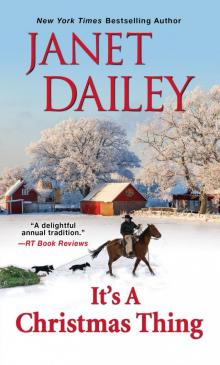 It's a Christmas Thing
It's a Christmas Thing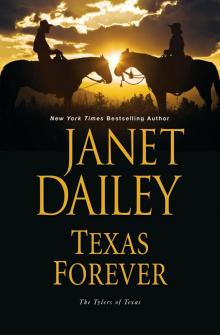 Texas Forever
Texas Forever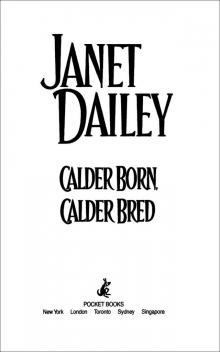 Calder Born, Calder Bred
Calder Born, Calder Bred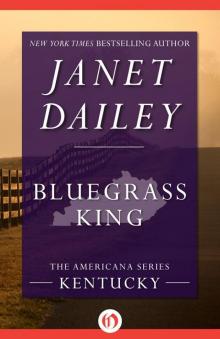 Bluegrass King (The Americana Series Book 17)
Bluegrass King (The Americana Series Book 17) One of the Boys
One of the Boys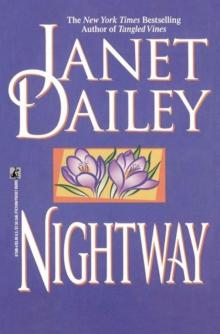 Nightway
Nightway This Calder Sky
This Calder Sky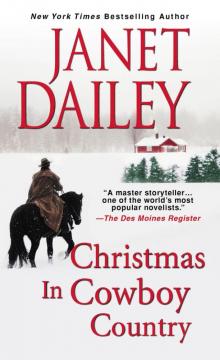 Christmas in Cowboy Country
Christmas in Cowboy Country The Widow and the Wastrel
The Widow and the Wastrel Separate Cabins
Separate Cabins Darling Jenny
Darling Jenny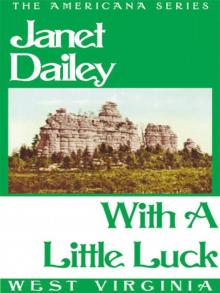 With a Little Luck
With a Little Luck The Thawing of Mara
The Thawing of Mara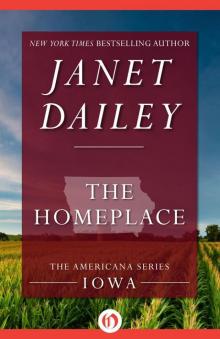 The Homeplace (The Americana Series Book 15)
The Homeplace (The Americana Series Book 15)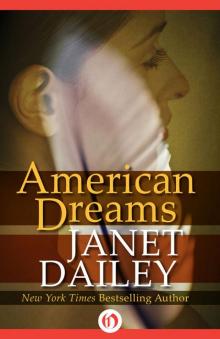 American Dreams
American Dreams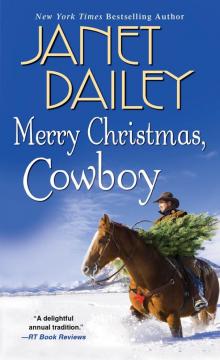 Merry Christmas, Cowboy
Merry Christmas, Cowboy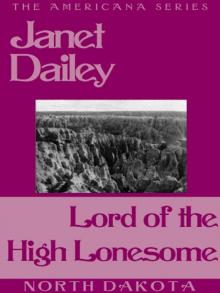 Lord of the High Lonesome
Lord of the High Lonesome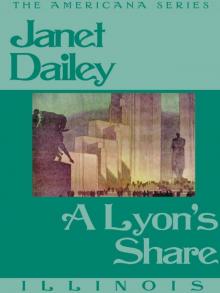 A Lyon's Share
A Lyon's Share After the Storm
After the Storm Masquerade
Masquerade Long, Tall Christmas
Long, Tall Christmas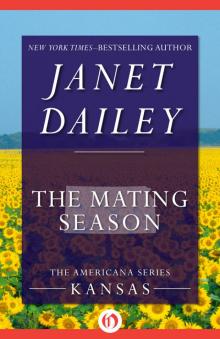 The Mating Season
The Mating Season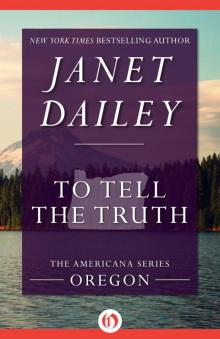 To Tell the Truth
To Tell the Truth A Land Called Deseret
A Land Called Deseret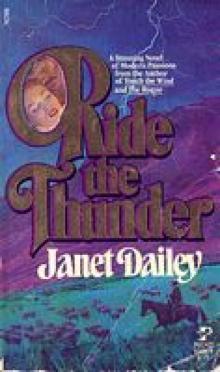 Ride the Thunder
Ride the Thunder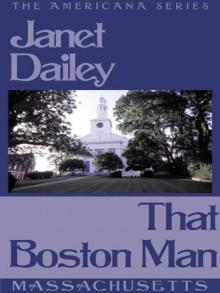 That Boston Man
That Boston Man Wild and Wonderful
Wild and Wonderful Sonora Sundown: Arizona (The Americana Series Book 3)
Sonora Sundown: Arizona (The Americana Series Book 3)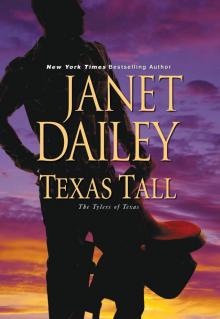 Texas Tall
Texas Tall Giant of Mesabi
Giant of Mesabi The Bride of the Delta Queen
The Bride of the Delta Queen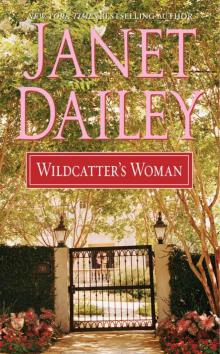 Wildcatter's Woman
Wildcatter's Woman Difficult Decision
Difficult Decision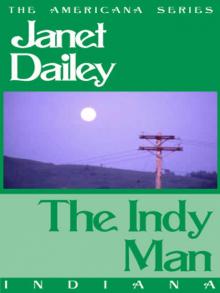 The Indy Man
The Indy Man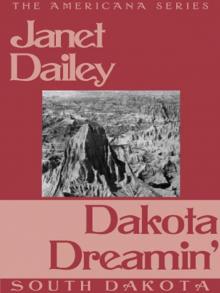 Dakota Dreamin'
Dakota Dreamin' Kona Winds
Kona Winds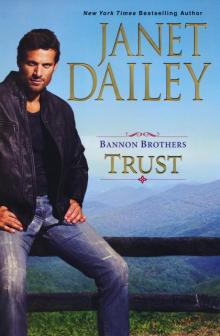 Bannon Brothers
Bannon Brothers The Lancaster Men
The Lancaster Men janet dailey- the healing touch
janet dailey- the healing touch Strange Bedfellow
Strange Bedfellow Leftover Love
Leftover Love Big Sky Country
Big Sky Country My Kind of Christmas
My Kind of Christmas You're Still The One
You're Still The One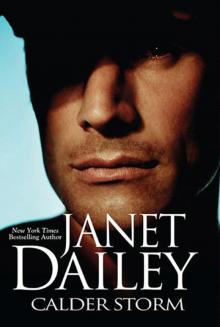 Calder Storm
Calder Storm Calder Pride
Calder Pride Low Country Liar
Low Country Liar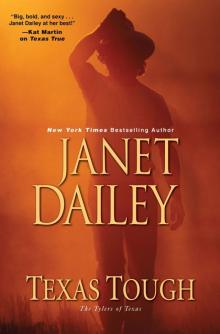 Texas Tough
Texas Tough Foxfire Light
Foxfire Light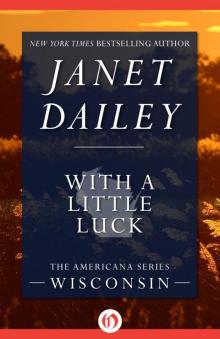 With a Little Luck (The Americana Series Book 49)
With a Little Luck (The Americana Series Book 49)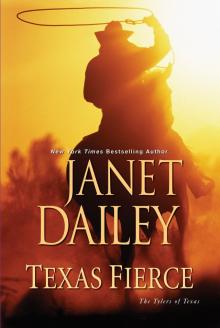 Texas Fierce
Texas Fierce Sentimental Journey
Sentimental Journey The Pride of Hannah Wade
The Pride of Hannah Wade Shifting Calder Wind
Shifting Calder Wind Santa In Montana
Santa In Montana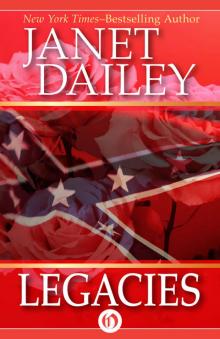 Legacies
Legacies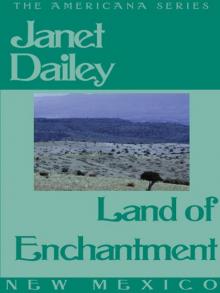 Land of Enchantment
Land of Enchantment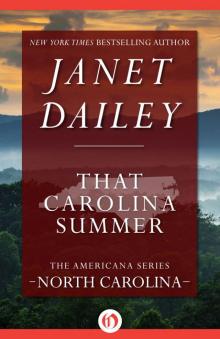 That Carolina Summer (North Carolina)
That Carolina Summer (North Carolina) Reilly's Woman
Reilly's Woman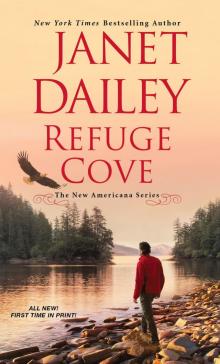 Refuge Cove
Refuge Cove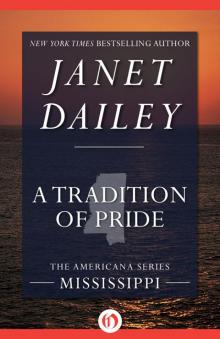 A Tradition of Pride
A Tradition of Pride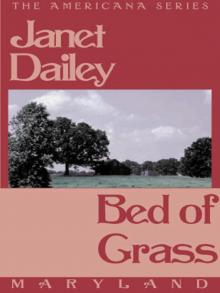 Bed of Grass
Bed of Grass To Santa With Love
To Santa With Love Dangerous Masquerade
Dangerous Masquerade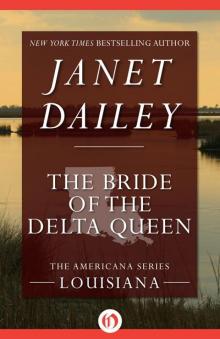 The Bride of the Delta Queen (The Americana Series Book 18)
The Bride of the Delta Queen (The Americana Series Book 18) Six White Horses
Six White Horses Valley of the Vapours (The Americana Series Book 4)
Valley of the Vapours (The Americana Series Book 4)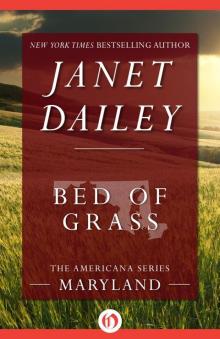 Bed of Grass (The Americana Series Book 20)
Bed of Grass (The Americana Series Book 20)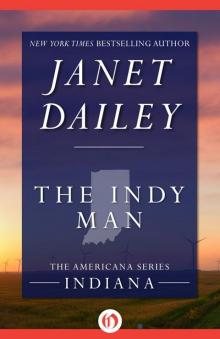 The Indy Man (The Americana Series Book 14)
The Indy Man (The Americana Series Book 14) After the Storm (The Americana Series Book 6)
After the Storm (The Americana Series Book 6)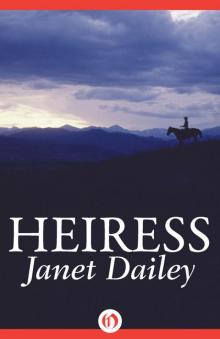 Heiress
Heiress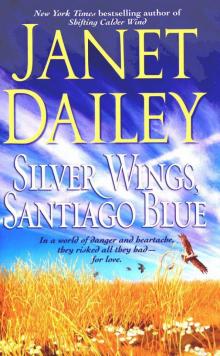 Silver Wings, Santiago Blue
Silver Wings, Santiago Blue The Rogue
The Rogue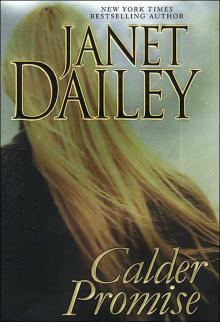 Calder Promise
Calder Promise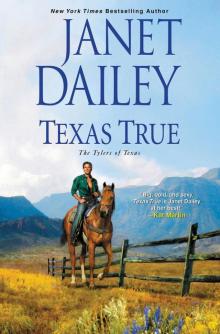 Texas True
Texas True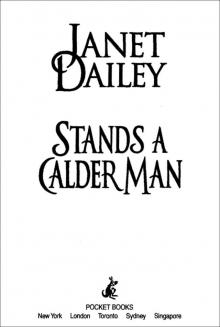 Stands a Calder Man
Stands a Calder Man Fiesta San Antonio
Fiesta San Antonio Fire and Ice
Fire and Ice For the Love of God
For the Love of God The Ivory Cane
The Ivory Cane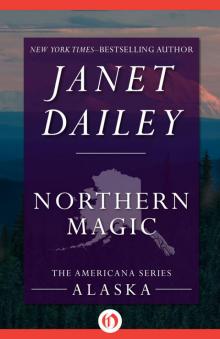 Northern Magic
Northern Magic The Glory Game
The Glory Game The Homeplace
The Homeplace The Great Alone
The Great Alone Summer Mahogany
Summer Mahogany Tangled Vines
Tangled Vines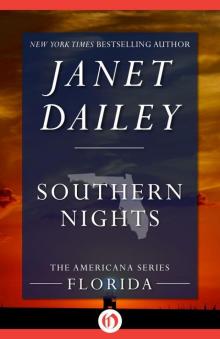 Southern Nights: Florida (The Americana Series Book 9)
Southern Nights: Florida (The Americana Series Book 9) Beware of the Stranger
Beware of the Stranger Big Sky Country: Montana (The Americana Series Book 26)
Big Sky Country: Montana (The Americana Series Book 26)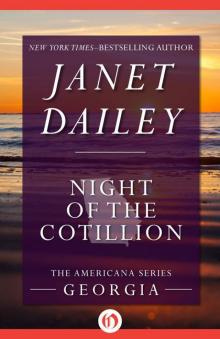 Night of the Cotillion: Georgia (The Americana Series Book 10)
Night of the Cotillion: Georgia (The Americana Series Book 10)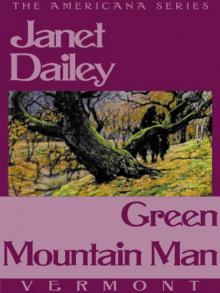 Green Mountain Man
Green Mountain Man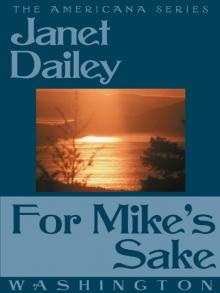 For Mike's Sake
For Mike's Sake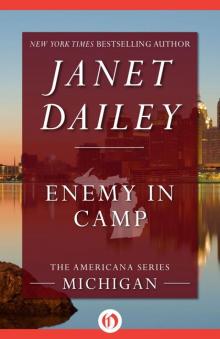 Enemy in Camp (The Americana Series Book 22)
Enemy in Camp (The Americana Series Book 22)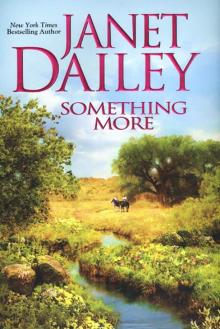 Something More
Something More Rivals
Rivals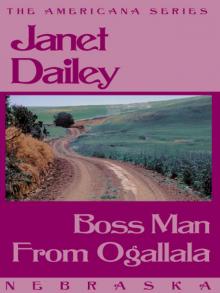 Boss Man from Ogallala
Boss Man from Ogallala Just a Little Christmas
Just a Little Christmas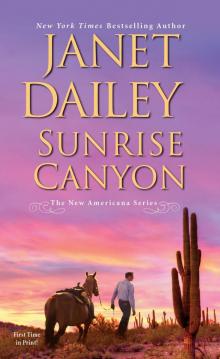 Sunrise Canyon
Sunrise Canyon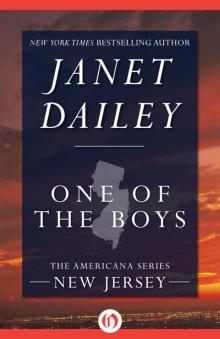 One of the Boys (New Jersey)
One of the Boys (New Jersey)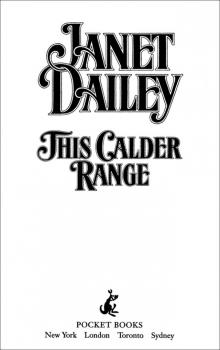 This Calder Range
This Calder Range Difficult Decision: Connecticut (The Americana Series Book 7)
Difficult Decision: Connecticut (The Americana Series Book 7) Honor
Honor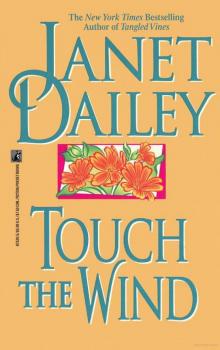 Touch the Wind
Touch the Wind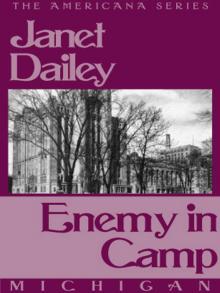 Enemy in Camp
Enemy in Camp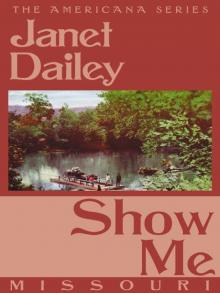 Show Me
Show Me No Quarter Asked
No Quarter Asked The Second Time
The Second Time Aspen Gold
Aspen Gold Sweet Promise
Sweet Promise Triumph
Triumph Savage Land
Savage Land Fire and Ice (The Americana Series Book 5)
Fire and Ice (The Americana Series Book 5) Western Man
Western Man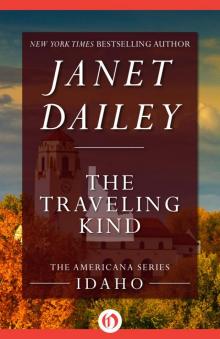 The Traveling Kind
The Traveling Kind The Hostage Bride
The Hostage Bride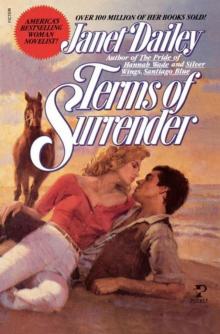 Terms of Surrender
Terms of Surrender Tidewater Lover
Tidewater Lover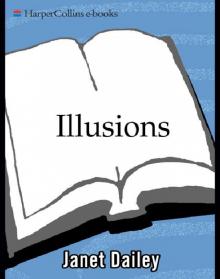 Illusions
Illusions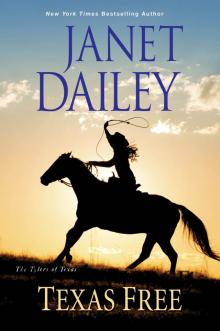 Texas Free
Texas Free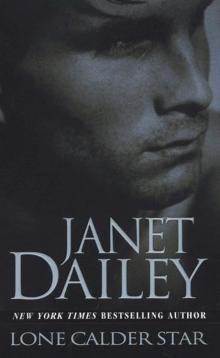 Lone Calder Star (Calder Saga Book 9)
Lone Calder Star (Calder Saga Book 9)